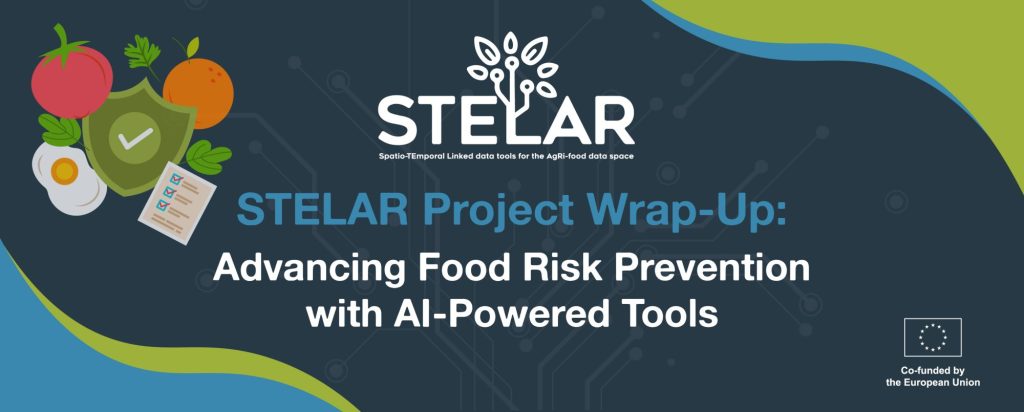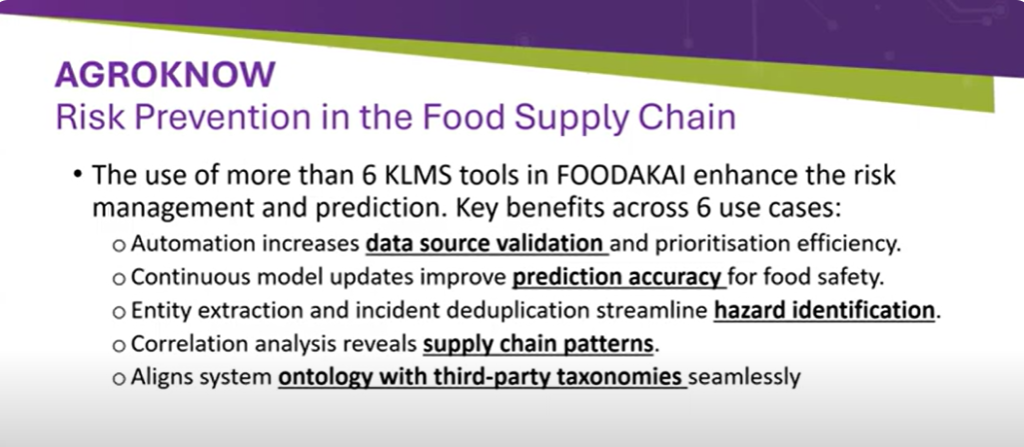STELAR Piloting Activities Wrap-Up: Advancing Food Risk Prevention with AI-Powered Tools

The Horizon Europe project STELAR, a three-year innovation action, is finishing this August after advancing the way data is used to strengthen safety and transparency in the agrifood sector.
Bringing together recognisable academic and industry partners across Europe, the project has tested its results through three pilots in real-world settings. Among them, Pilot A, led by AGROKNOW in Greece, focused on food risk prevention, showing how artificial intelligence and automation can support faster, more reliable decision-making in food supply chains.
Key Success: Turning Complex Data into Actionable Insights
Pilot A integrated several tools developed within STELAR into AGROKNOW’s proprietary FOODAKAI platform, a food safety intelligence solution used by companies and authorities worldwide. This integration allowed the platform to demonstrate how fragmented, high-volume data can be converted into early warnings and practical guidance for risk prevention.
The pilot tackled challenges that are central to modern food safety management: extracting information from incident reports using natural language processing, removing duplicate alerts to clarify insights, running correlation analysis across multiple time series, and aligning diverse data schemas with internal taxonomies.
A large-scale effort also applied large language models to ingredient mapping, covering more than 6,800 client ingredients, 15,400 FOODAKAI ingredients, nearly one million suppliers, and over 2,500 hazards. The scale of this exercise highlighted the importance of automation in making food safety intelligence usable and efficient.

“Food safety management is about timeliness, precision, and trust. By integrating STELAR tools into our FOODAKAI platform, we are showing how advanced AI methods can reduce risks and improve confidence in supply chains”
Charalampos Thanopoulos, Head of R&D at AGROKNOW
Watch the video about Pilot A below.
Integrating Satellite Data and Crop Models
At the heart of Pilot B is the PROMET model, a computer simulation that accounts for water, energy, carbon and nitrogen cycles to represent crop growth. VISTA has combined this model with information from Sentinel-2 and other multispectral and hyperspectral satellites, including Landsat-8, -9 and hyperspectral sensors such as EnMAP. By drawing on different sensors and integrating field observations, the Pilot has been able to refine its forecasts and increase accuracy. Altogether, Pilot B processed nearly one terabyte of satellite imagery from different years and European regions. This large-scale test demonstrated how data fusion and machine learning can enhance crop growth predictions, support yield estimation, and improve agricultural risk management, while contributing to more sustainable farming practices.
Applications and Outcomes
The outcomes of Pilot A showed how AI-powered intelligence can support day-to-day food safety operations. Among the demonstrated applications were:
- Automated risk assessments
- Harmonised data for procurement and compliance
- Improved traceability
- Regulatory reporting support
- The development of AI-driven food safety assistants.
Together, these innovations enable faster, better-informed decisions while reducing the margin of human error – an essential step toward safer and more transparent food systems.
Next Steps: Scaling Impact Across the Agrifood Sector
As STELAR concludes, the project is preparing for wider impact beyond its pilots. Planned actions include engaging policymakers in discussions on data transparency and interoperability, refining tools through ongoing user feedback, and strengthening open-source collaborations to broaden adoption. Future efforts will also explore integration with emerging AI technologies, ensuring that the methods developed remain relevant and scalable across diverse agrifood contexts.
Collaborating Partners
Pilot A was led by AGROKNOW in Greece, with contributions from Athena Research Center, Eindhoven University of Technology (TU/e), Universität der Bundeswehr München (UniBwM), and Foodscale Hub (FSH). Along with the rest of the project consortium, the organisations demonstrated how European research collaboration can deliver practical, real-world benefits for food safety and supply chain resilience.
Foodscale Hub lead the project’s Dissemination, Exploitation and Communication activities, while also supporting pilot preparation, KPI development, and ecosystem synergies to ensure sustainability of results.
For more information about Pilot B and the STELAR project, visit stelar-project.eu and follow STELAR on LinkedIn for updates.